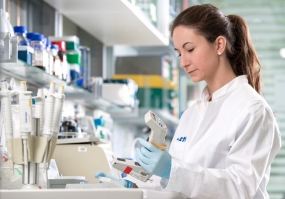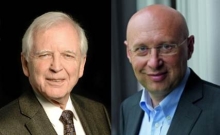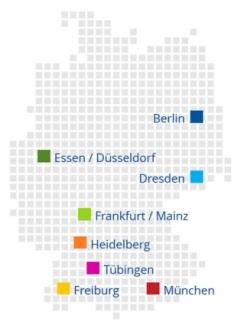Research Topics at the DKFZ
The long-term goal of the German Cancer Research Center is to unravel the causes and mechanisms of cancer development and, based on new insights, to develop novel tools for diagnosis, early detection, treatment and prevention.
In 2018, scientists at the DKFZ have published 1,864 research articles, many of them in high-ranking journals like Cell, Nature and Science.

© dkfz.de
The divisions and research groups of the DKFZ are organized into six Research Programs:
- Cell Biology and Tumor Biology
- Functional and Structural Genomics
- Cancer Risk Factors and Prevention
- Immunology and Cancer
- Imaging and Radiooncology
- Infection, Inflammation and Cancer
There is a lot of interaction at the DKFZ due to interdisciplinary collaborations and cross-topics:
- Computational Cancer Research, Data Science and Artificial Intelligence
- Medical Physics and Radiopharmaceutical Sciences
- Epidemiology and Biostatistics
- Cancer Epigenetics
- Infection and Immunology
If you are interested in one of these topics, you get more information by clicking on the respective link:
If you are invited for the interviews, you will receive a list of PhD project proposals from which you can select those you are interested in and discuss them further with the respective PhD supervisors.
Research profiles of divisions/research groups at the DKFZ can be found here.
Watch the movie about the DKFZ here:
Nobel Laureates at the DKFZ

Our Nobel laureates Prof. Harald zur Hausen (left) and Prof. Stefan Hell (right)
© DKFZ, Max-Planck-Institut für biophysikalische Chemie
In recent years, researchers at the DKFZ have been responsible for major advances both in basic research and in the development of novel methods for clinical application. These achievements received momentous recognition in 2008, when the Center’s Professor Harald zur Hausen was awarded the Nobel Prize for Medicine for his outstanding scientific contribution to the study of human papillomaviruses. In 2014, for the second time a researcher at the DKFZ was awarded the highest distinction in science: Professor Stefan Hell received the Nobel Prize in Chemistry for his pioneering work in the field of ultra-high resolution fluorescence microscopy.
Translational Cancer Research

Contributions from many disciplines, an excellent research infrastructure and systematic interactions among the DKFZ research groups provide a strong framework for our projects.
Additionally, the DKFZ fosters translational cancer research:
The DKFZ is the core center of the German Cancer Consortium (DKTK) which further includes seven partner sites across Germany, building a network of some of the strongest cancer research and cancer therapy centers in the country. The goal of the DKTK is to develop customized approaches for better patient care – all the way from basic research to clinical implementation.
The DKFZ is also a cooperation partner of the National Center for Tumor Diseases (NCT), together with the University Hospital Heidelberg and the German Cancer Aid (Deutsche Krebshilfe). Here, clinicians and cancer researchers work closely together in different clinical and translational cancer programs.
Helmholtz Association

The DKFZ is a member of the Helmholtz Association, the largest research organisation in Germany. For more information on the Helmholtz Association, have a look here.
